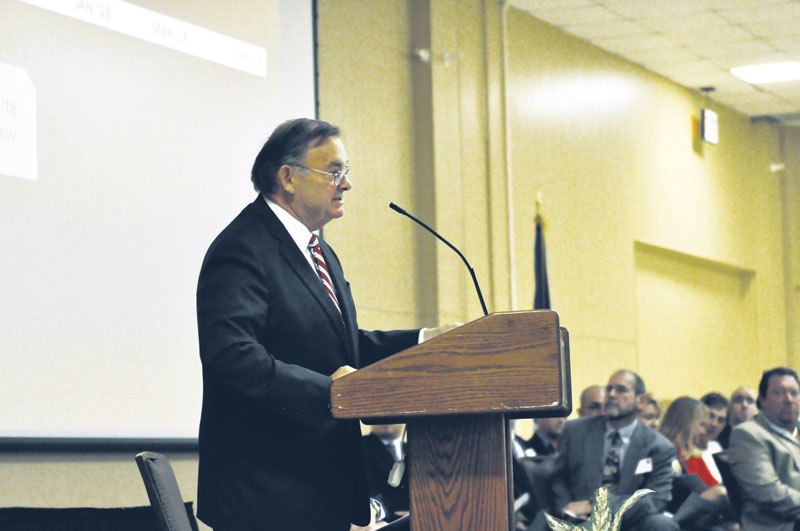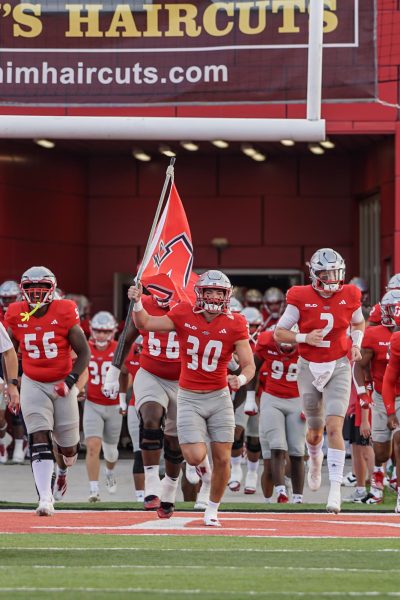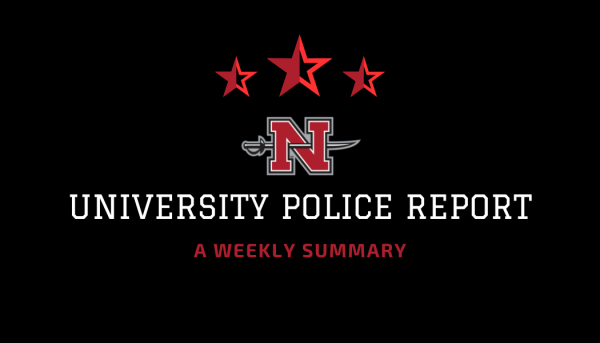Potential budget cuts headline State of University Address
Photo by: Juliana Pennison
President Bruce Murphy addresses faculty and staff during Faculty Institute.
President Murphy was optimistic that Nicholls will remain “the intellectual, economic and cultural heart of the bayou region” in his State of the University address at the Faculty Institute last week, despite the threat of budget cuts.
“It’s not helpful to doom and gloom, to wring your hands or to belittle what we have. We are going to survive. We are going to make it through, and we are going to do that by controlling as much of our destiny as we possibly can,” Murphy said.
One way that Murphy suggested to “control our destiny” is to “always think of the face of Nicholls.”
According to Murphy, the overall face of the University includes everything from the messages on office telephones, the look of the Nicholls website, the clean campus and the way faculty interact with the students.
He encouraged the faculty to keep standards in the classroom high, but to have empathy for the students. He encouraged them to be clear with their expectations and to work as mentors and guides for the students.
“We can treat students as if they have a choice, because they do,” Murphy said.
In the last 10 minutes of his address, Murphy mentioned the “elephant in the room,” the looming threat of state budget cuts.
According to Murphy, the governor’s office is crafting their budget, and there are supposed to be significant cuts to higher education across the board.
“Here at Nicholls”, Murphy said, “we are thinking about how we would react to various situations,” but “have not identified any particular areas or populations or anything else. We are thinking about it.”
The budget at Nicholls should remain stable until June 2015. However, as Murphy mentioned at last fall’s faculty institute, there are problems with the budgeting process as a whole at Nicholls.
“While we were able to place a budget together and we did have certain controls over the budget,” Murphy said, “we did not approach it in a strategic fashion, and I pledged to you in August that we would correct this in the future.”
Murphy has created another committee in order to attempt to rectify the budgeting process.
“We have established a budget review committee whose job will be to conduct budget hearings, receive requests and recommend funding for budget proposals, plans and priorities,” Murphy said.
This group has broad representation across the University’s community, and a large portion of the committee is to be comprised of faculty.
Another theme of Murphy’s address was the idea of open governance. He encouraged the faculty to talk to the university council, a group he organized last year.
The council, which includes vice presidents, deans, the faculty senate and members of the president’s senior staff, meets biweekly and is charged with framing policy and procedure. The council also makes recommendations to the president and aligns the strategic plan with available resources to ensure that the University fulfills its mission.
Brigett Scott, faculty senate president and department head and assistant professor of dietetics, was very supportive of Murphy’s message.
“It’s really difficult when you hear things about budget cuts and that sort of thing, and I think he did a really good job of keeping his message positive,” Scott said. “No specific plans have been discussed, and we’re just hoping that money is found in other places because that has been mentioned.”
Murphy announced that he had goals of increasing enrollment to 8,000 students and doubling the endowment to $50 million. His plans to reach this goal include increasing new programs like Nicholls Online and reaching out to new markets. He also mentioned another goal of decreasing transfers, dropouts, “red tape” and “frustrated potential,” which Murphy explained as students who may want to go to Nicholls but, for whatever reason, do not make it here.
On one side of his presentation, he listed steps that need to be taken to reach the goals.
Michael Jeffress, faculty senate member and speech instructor, expressed concerns about some of the bullet points in the presentation that Murphy listed but did not elaborate on.
“We have to eliminate ‘hobby shops’ and ‘good for naught,’ and I think that raised a lot of red flags among people,” Jeffress said. “I think the faculty is anxious to hear how he defines ‘good for naught’ and ‘hobby shop’?”
“Things that we are doing that don’t lead to that end, we are to stop doing,” Murphy said. “I know that’s a hard pill to swallow, but that’s what we have to do.”
“I’m hoping that we will have clear and constant communication as we go through this, knowing that it’s a time of anxiety for the faculty,” Jeffress said.
Without communication between the administration and faculty, people are going to worry, rumors will spread and it will not be good for morale, which has already been low for years, according to Jeffress.
“I do believe that Dr. Murphy is going to do right by us,” Jeffress said. However, he hopes that with whatever happens that “faculty has a strong voice.”
Murphy stressed the importance of standing up for higher education.
“If you say ‘I don’t believe in higher education,’ or ‘I don’t believe in Nicholls,’ then you probably shouldn’t be here,” Murphy said.
Jeffress encouraged every student at Nicholls to contact their state legislators.
“Email, call, write them a letter and say ‘Protect Nicholls State University’ and ‘Protect higher education,’” Jeffress said. “If Jindal has his way, then by the time he leaves office he will have cut funding across the state by a billion dollars.”
“Higher education cannot always be the go-to thing that’s cut in this state,” Jeffress said.







